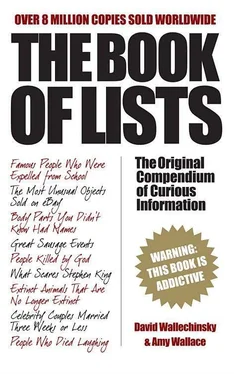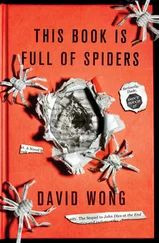David Wallechinsky - The Book of Lists
Здесь есть возможность читать онлайн «David Wallechinsky - The Book of Lists» весь текст электронной книги совершенно бесплатно (целиком полную версию без сокращений). В некоторых случаях можно слушать аудио, скачать через торрент в формате fb2 и присутствует краткое содержание. Город: Edinburgh, Год выпуска: 2009, ISBN: 2009, Издательство: Canongate Books, Жанр: Справочники, на английском языке. Описание произведения, (предисловие) а так же отзывы посетителей доступны на портале библиотеки ЛибКат.
- Название:The Book of Lists
- Автор:
- Издательство:Canongate Books
- Жанр:
- Год:2009
- Город:Edinburgh
- ISBN:978-1-84767-667-2
- Рейтинг книги:3 / 5. Голосов: 1
-
Избранное:Добавить в избранное
- Отзывы:
-
Ваша оценка:
- 60
- 1
- 2
- 3
- 4
- 5
The Book of Lists: краткое содержание, описание и аннотация
Предлагаем к чтению аннотацию, описание, краткое содержание или предисловие (зависит от того, что написал сам автор книги «The Book of Lists»). Если вы не нашли необходимую информацию о книге — напишите в комментариях, мы постараемся отыскать её.
The Book of Lists — читать онлайн бесплатно полную книгу (весь текст) целиком
Ниже представлен текст книги, разбитый по страницам. Система сохранения места последней прочитанной страницы, позволяет с удобством читать онлайн бесплатно книгу «The Book of Lists», без необходимости каждый раз заново искать на чём Вы остановились. Поставьте закладку, и сможете в любой момент перейти на страницу, на которой закончили чтение.
Интервал:
Закладка:
‘“Christmas won’t be Christmas without any presents,” grumbled Jo, lying on the rug.’
– Little Women , Louisa May Alcott‘3 May. Bistritz. Left Munich at 8:35 p.m., on 1st May, arriving at Vienna early next morning; should have arrived at 6:46, but train was an hour late.’
– Dracula , Bram Stoker‘Someone must have been telling lies about Joseph K., for without having done anything wrong he was arrested one fine morning.’
– The Trial , Franz Kafka‘When he was nearly thirteen my brother Jem got his arm badly broken at the elbow.’
– To Kill a Mockingbird , Harper Lee‘Amerigo Bonasera sat in New York Criminal Court Number 3 and waited for justice; vengance on the men who had so cruelly hurt his daughter, who had tried to dishonor her.’
– The Godfather , Mario Puzo‘In eighteenth-century France there lived a man who was one of the most gifted and abominable personages in an era that knew no lack of gifted and abominable personages.’
– Perfume , Patrick Suskind‘It was a bright cold day in April, and the clocks were striking thirteen.’
– 1984 , George Orwell‘If you really want to hear about it, the first thing you’ll probably want to know is where I was born, and what my lousy childhood was like, and how my parents were occupied and all before they had me, and all that David Copperfield kind of crap, but I don’t feel like going into it, if you want to know the truth.’
– Catcher in the Rye , J.D. Salinger‘It was about eleven o’clock in the morning, mid-October, with the sun not shining and a look of hard wet rain in the clearness of the foothills. I was wearing my powder-blue suit, with dark blue shirt, tie and display handkerchief, black brogues, black wool socks with dark blue clocks on them. I was neat, clean, shaved and sober, and I didn’t care who knew it. I was everything the well-dressed private detective ought to be.’
– The Big Sleep , Raymond Chandler‘People are afraid to merge on freeways in Los Angeles.’
– Less Than Zero , Brett Easton Ellis‘All nights should be so dark, all winters so warm, all headlights so dazzling.’
– Gorky Park , Martin Cruz Smith
– The Eds & S.C.B.10 POETS AND HOW THEY EARNED A LIVING
Trained as an engraver, Blake studied art at the Royal Academy but left to earn a living engraving for booksellers. For a few years he was a partner in a print-selling and engraving business. He then worked as an illustrator, graphic designer and drawing teacher. It became increasingly hard for Blake to earn a living. He had a patron but lived essentially in poverty and obscurity, occasionally receiving an art commission. Blake was later recognised as one of England’s finest engravers and most remarkable poet.
Raised on a farm in Ayrshire, Burns was a full-time labourer on the land at the age of 15. He tried to become a surveyor, but ill health forced him to give up. Next he lived with relatives who ran a flax-dressing business, until their shop burned down. Farming barely paid his bills, so Burns published Poems, Chiefly in the Scottish Dialect in 1786 to get money for passage to Jamaica, where he had a job offer as an overseer. The book was so successful that he used the money to visit Edinburgh instead. Returning to the farm, Burns took a job as a tax inspector, trying unsuccessfully to juggle three occupations. He lost the farm, but moved to Dumfries and continued as a tax inspector and poet.
Keats was trained as a surgeon and apothecary in Edmonton, and later moved to London to work as a dresser in a hospital. For a year or so Keats had his own surgeon/apothecary practice, and at the same time began publishing his poetry. His first major work, Poems , appeared in 1817, and that year he gave up medicine for the literary life. Charles Armitage Brown became his patron, providing him with a house in Hampstead, outside London.
Whitman had a chequered career in newspaper work, starting as a printer’s assistant and eventually becoming an editor in New York throughout the 1840s. After ten years he gave up journalism for carpentry and verse. During the Civil War, Whitman moved to Washington, DC, took a job in the paymaster’s office, and spent his spare time nursing the wounded. In 1865 he became a clerk at the Department of the Interior’s Bureau of Indian Affairs, but was soon fired for being the author of the scandalous Leaves of Grass . He then clerked in the attorney general’s office until a paralytic stroke forced him to retire in 1873.
Rimbaud’s lover Paul Verlaine supported him for a while in Paris; after their separation, Rimbaud lived in London, working at various menial jobs until poverty or ill health or both caused his return to France. In 1876 he joined the Dutch colonial army and went to Indonesia, but deserted and again returned to France. From there he joined a circus en route to Scandinavia; went to Cyprus as a labourer and later as a builder’s foreman; and finally gave up his wandering in Harar, Ethiopia. There he worked for a coffee exporter, and later tried (unsuccessfully) to become an independent arms dealer. In 1888 he was managing a trading post, dealing in coffee, ivory, arms and possibly slaves.
After leaving Harvard University without a degree, Stevens was a reporter for the New York Herald Tribune for a year. He then attended New York University Law School, passed the bar in 1904, and for the next 12 years practised law in New York. In 1916 he joined the legal department of the Hartford Accident and Indemnity Company in Connecticut; by 1934 he was vice-president of the company.
Williams earned a medical degree from the University of Pennsylvania in 1906, interned at a hospital in New York City, and for a year did postgraduate work in paediatrics at the University of Leipzig in Germany. He established a medical practice in his home town of Rutherford, New Jersey, in 1910, and until the mid-1950s maintained both a medical and a literary career. An appointment to the chair of poetry at the Library of Congress in 1952 was withdrawn because of Williams’s radical politics. He spent his last 10 years lecturing at many American universities.
In recognition of his poetic skills, the Chilean government awarded Neruda with a non-paying position as Chile’s consul in Burma in 1927. Eventually he graduated to a salaried office, serving in Ceylon, the Dutch East Indies, Argentina and Spain. With the outbreak of the Spanish Civil War in 1936, Neruda, without waiting for orders, declared Chile on the side of the Spanish republic. He was recalled by the Chilean government and later reassigned to Mexico. In 1944 he was elected to the national senate as a member of the Communist Party. He later served as a member of the central committee of the Chilean Communist Party and as a member of the faculty of the University of Chile.
In 1945, while suspended from Columbia University for a year, Ginsberg worked as a dishwasher in a Times Square, New York, restaurant, as a merchant seaman and a reporter for a newspaper in New Jersey. He returned to Columbia and graduated with a BA in literature in 1948. Far more influential was his off-campus friendship with a number of figures in the future Beat movement, including Jack Kerouac, Neal Cassady and William S. Burroughs. In 1949 Ginsberg was arrested for letting one of the friends, Herbert Huncke, use his apartment to store some stolen property. For his sentence, Ginsberg was committed to a psychiatric hospital for eight months. Upon his release, he went home to Patterson, New Jersey, to live with his father. After a few years, Ginsberg completely changed his lifestyle. He moved to San Francisco and led a life of middle-class respectability. He had a high-paying job in market research, a live-in girlfriend and an upscale apartment. He was also miserable and began seeing a therapist. ‘The doctor kept asking me, “What do you want to do?” Finally I told him — quit. Quit the job, my tie and suit, the apartment on Nob Hill. Quit it and go off and do what I wanted, which was to get a room with Peter [Orlovsky], and devote myself to writing and contemplation, to Blake and smoking pot, and doing whatever I wanted.’ Ginsberg wrote a memo to his boss explaining how his position could be eliminated and then he left. In 1955, shortly after devoting himself to poetry, he created a sensation with the first public reading of his poem ‘Howl’, an event considered the birth of the Beat revolution. Ginsberg and his partner, Orlovsky, were able to live off Ginsberg’s royalties, money Ginsberg earned at poetry readings and disability cheques Orlovsky received as a Korean War veteran.
Читать дальшеИнтервал:
Закладка:
Похожие книги на «The Book of Lists»
Представляем Вашему вниманию похожие книги на «The Book of Lists» списком для выбора. Мы отобрали схожую по названию и смыслу литературу в надежде предоставить читателям больше вариантов отыскать новые, интересные, ещё непрочитанные произведения.
Обсуждение, отзывы о книге «The Book of Lists» и просто собственные мнения читателей. Оставьте ваши комментарии, напишите, что Вы думаете о произведении, его смысле или главных героях. Укажите что конкретно понравилось, а что нет, и почему Вы так считаете.












